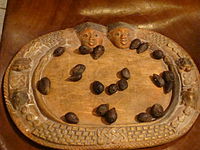- Ogboni
-
This article is about southwest Nigerian fraternal organization. For indigenous people of southeast Nigeria, see Ogoni people.
Ogboni (also known as Osugbo in Ijèbú) is a fraternal institution indigenous to the Yoruba language-speaking polities of Nigeria, Republic of Bénin and Togo. The society performs a range of political and religious functions, including exercising a profound influence on regents and serving as high courts of jurisprudence in capital offenses.
Influence
Though versions or lodges of this fraternal group are found among the various types of Yoruba polities——from highly-centralized kingdoms and empires like Oyo, to the independent towns and villages of the Ègbá and the Èkiti——the Ogboni are recognizable for their veneration of the personified earth (Ilè or Odua) and their emphasis on gerontocratic authority and benevolent service to the town. While membership in the Ogboni generally signified a high level of power and prestige, the society held pre-eminent political authority among decentralized groups like the Ègbá, where they were intimately involved in the selection of regents. To date, Ogboni members still command great power and influence in the affairs of their nations, though this is largely due to the history of their titles and not their official power.
Ogboni lodges were one of the main commissioners of brass jewelry and sculpture in pre-colonial Yorubaland, using the metal's rust-resistant qualities as an apt metaphor for the immortal functions and beliefs of Ogboni adepts. The most recognizable of these symbols was a pair of Ogboni initiates, one male and one female, attached by a chain and worn around the neck. The pair are thought to symbolize the attachment of the sexes in procreation and balanced society. Generally, one or both figures will hold a thumb in the grip of the opposite hand, demonstrating the paramount Ogboni handsign denoting initiation and membership.
Legacy
Various fraternities in Nigeria have incorporated references and insignia from the original Ogboni, including the Reformed Ogboni Fraternity, the Indigenous Ogboni, and various others. Many of these contemporary societies combine elements of Ogboni’s historical functions with superficially similar institutions like Freemasonry and the Rotary Club.
Similar traditional institutions combining political, judicial, and sacred duties exist among the various ethnic nationalities of southern Nigeria, including Okonko in Igbo-speaking southeast Nigeria and Ekpe/Ngbe/Ugbe in the Cross River region of southeastern Nigeria and southwestern Cameroon. Initatory secret societies are a common feature of pre-colonial government across much of West Africa and Central Africa.[citation needed]
Deities Supreme BeingCountries Nigeria · Cuba-Puerto Rico · Trinidad · Brazil · United States · Colombia · Venezuela · Mexico · BeninTopics Sacred sites Legendary figures Categories:- Yoruba history
- Fraternal service organizations
Wikimedia Foundation. 2010.

